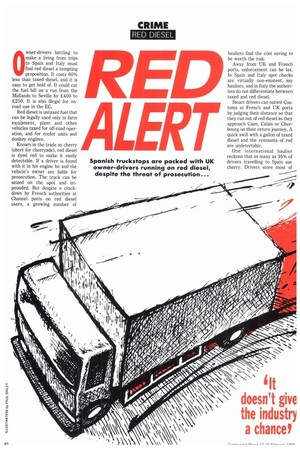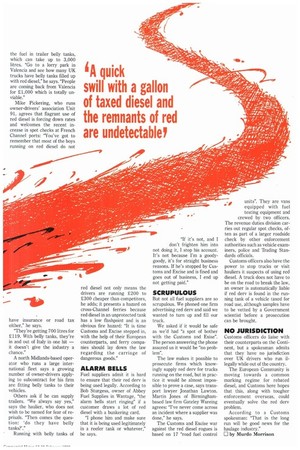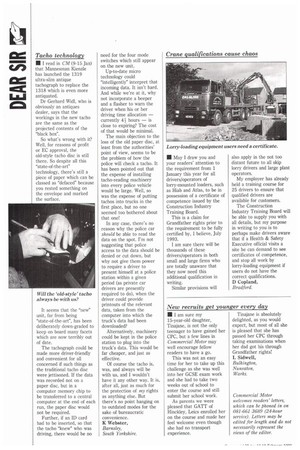CRIME
Page 42

Page 43

Page 44

If you've noticed an error in this article please click here to report it so we can fix it.
RED DIESEL
0 wner-drivers battling to make a living from trips to Spain and Italy must find red diesel a tempting proposition. It costs 60% less than taxed diesel, and it is easy to get hold of. It could cut the fuel bill on a run from the Midlands to Seville by £400 to 2250. It is also illegal for onroad use in the EC.
Red diesel is untaxed fuel that can be legally used only in farm equipment, plant and other vehicles taxed for off-road operation, and for reefer units and donkey engines.
Known in the trade as cherry (short for cherryade), red diesel is dyed red to make it easily detectable. If a driver is found with it in his engine he and the vehicle's owner are liable for prosecution. The truck can be seized on the spot and impounded. But despite a crackdown by French authorities at Channel ports on red diesel users, a growing number of
hauliers find the cost saving to be worth the risk.
Away from UK and French ports, enforcement can be lax. In Spain and Italy spot checks are virtually non-existent, say hauliers, and in Italy the authorities do not differentiate between taxed and red diesel.
Smart drivers can outwit Customs at French and UK ports by judging their distance so that they run out of red diesel as they approach Caen, Calais or Cherbourg on their return journey. A quick swill with a gallon of taxed diesel and the remnants of red are undetectable.
One international haulier reckons that as many as 35% of drivers travelling to Spain use cherry. Drivers store most of the fuel in trailer belly tanks, which can take up to 3,000 litres. "Go to a lorry park in Valencia and see how many UK trucks have belly tanks filled up with red diesel," he says. "People are coming back from Valencia for £1,000 which is totally unviable."
Mike Pickering, who runs owner-drivers' association Unit 91, agrees that flagrant use of red diesel is forcing down rates and welcomes the recent increase in spot checks at French Channel ports: "You've got to remember that most of the boys running on red diesel do not have insurance or road tax either," he says.
"They're getting 700 litres for £119. With belly tanks, they're in and out of Italy in one hit — it doesn't give the industry a chance."
A north Midlands-based operator who runs a large international fleet says a growing number of owner-drivers applying to subcontract for his firm are fitting belly tanks to their vehicles.
Others ask if he can supply trailers. "We always say yes," says the haulier, who does not wish to be named for fear of reprisals. "Then comes the question: 'do they have belly tanks?'," Running with belly tanks of red diesel not only means the drivers are running £200 to £300 cheaper than competitors, he adds; it presents a hazard on cross-Channel ferries because red diesel in an unprotected tank has a low flashpoint and is an obvious fire hazard: "It is time Customs and Excise stepped in, with the help of their European counterparts, and ferry companies should lay down the law regarding the carriage of dangerous goods."
ALARM BELLS
Fuel suppliers admit it is hard to ensure that their red dery is being used legally. According to Bob Sturgess, owner of Abbey Fuel Supplies in Wantage, "the alarm bells start ringing" if a Customer draws a lot of red diesel with a bunkering card.
"I phone him and make sure that it is being used legitimately in a reefer tank or whatever," he says. "If it's not, and I don't frighten him into not doing it, I stop his account. It's not because I'm a goodygoody, it's for straight business reasons. If he's stopped by Customs and Excise and is fined and goes out of business, I end up not getting paid."
SCRUPULOUS
But not all fuel suppliers are so scrupulous. We phoned one firm advertising red dery and said we wanted to turn up and fill our truck.
We asked if it would be safe as we'd had "a spot of bother with the Customs and Exise". The person answering the phone assured us it would be "no problem".
The law makes it possible to prosecute firms which knowingly supply red dery for trucks running on the road, but in practice it would be almost impossible to prove a case, says transport lawyer Jonathan Lawton. Martin Jones of Birminghambased law firm Gateley Wareing agrees: "I've never come across an incident where a supplier was done," he says.
The Customs and Excise war against the red diesel rogues is based on 17 "road fuel control units". They are vans equipped with fuel
testing equipment and crewed by two Officers. The revenue duties division carries out regular spot checks, often as part of a larger roadside check by other enforcement authorities such as vehicle examiners, police and Trading Standards officials.
Customs officers also have the power to stop trucks or visit hauliers it suspects of using red diesel. A truck does not have to be on the road to break the law, an owner is automatically liable if red dery is found in the running tank of a vehicle taxed for road use, although samples have to be vetted by a Government scientist before a prosecution can be brought.
NO JURISDICTION
Customs officers do liaise with their counterparts on the Continent, but a spokesman admits that they have no jurisdiction over UK drivers who run illegally while out of the country.
The European Community is moving towards a common marking regime for rebated diesel, and Customs here hopes that this, along with tougher enforcement overseas, could eventually solve the red dery problem.
According to a Customs spokesman: "That in the long run will be good news for the haulage industry."
0 by Murdo Morrison
Tacho technology
MI I read in CM (945 Jan) that Mannesman Kienzle has launched the 1319 ultra-slim antique tachograph to replace the 1318 which is even more antiquated.
Dr Gerhard Widl, who is obviously an antiques dealer, says that the workings in the new tacho are the same as the projected contents of the "black box".
So what's wrong with it? Well, for reasons of profit or EC approval, the old-style tacho disc is still there. So despite all this "state-of-the-art" technology, there's still a piece of paper which can be classed as "defaced" because you rested something on the envelope and marked the surface.
It seems that the "new" unit, far from being "state-of-the-art", has been deliberately down-graded to keep on board many facets which are now terribly out of date.
The tachograph could be made more driver-friendly and convenient for all concerned if such things as the traditional tacho disc were jettisoned. lithe data was recorded not on a paper disc, but in a computer memory chip to be transferred to a central computer at the end of each run, the paper disc would not be required.
Further, if an ID card had to be inserted, so that the tacho "knew" who was driving, there would be no need for the four mode switches which still appear on the new unit.
Up-to-date micro technology could "intelligently" interpret that incoming data. It isn't hard. And while we're at it, why not incorporate a beeper and a flasher to warn the driver when his or her driving time allocation — currently 41 hours — is close to expiring? The cost of that would be minimal.
The main objection to the loss of the old paper disc, at least from the authorities' point of view, seems to be the problem of how the police will check a tacho. It has been pointed out that the expense of installing tacho-reading machinery into every police vehicle would be large. Well, so was the expense of putting tachos into trucks in the first place, but no one seemed too bothered about that one!
In any case, there's no reason why the police car should be able to read the data on the spot. I'm not suggesting that police access to the data should be denied or cut down, but why not give them power to require a driver to present himself at a police station within a given period (as private car drivers are presently required to do), when the driver could provide printouts of the relevant data, taken from the computer into which the truck's data had been downloaded?
Alternatively, machinery could be kept in the police station to plug into the truck's data. This would be far cheaper, and just as effective.
Of course the tacho is, was, and always will be with us, and I wouldn't have it any other way. It is, after all, just as much for the protection of my rights as anything else. But there's no point hanging on to outdated modes for the sake of bureaucratic convenience.
K Webster,
Barnsley, South Yorkshire. • May I draw you and your readers' attention to the requirement from 1 January this year for all drivers/operators of lorry-mounted loaders, such as Hiab and Atlas, to be in possession of a certificate of competence issued by the Construction Industry Training Board.
This is a claim for Grandfather rights prior to the requirement to be fully certified by, I believe, July 1993.
I am sure there will be thousands of these drivers/operators in both small and large firms who are totally unaware that they now need this additional qualification in writing.
Similar provisions will also apply in the not too distant future to all skip lorry drivers and large plant operators.
My employer has already held a training course for 25 drivers to ensure that qualified drivers are available for customers.
The Construction Industry Training Board will be able to supply you with all details, but my purpose in writing to you is to perhaps make drivers aware that if a Health & Safety Executive official visits a site he can demand to see certificates of competence, and stop all work by lorry-loading equipment if users do not have the correct qualifications.
D Copland, Bradford.




















































































